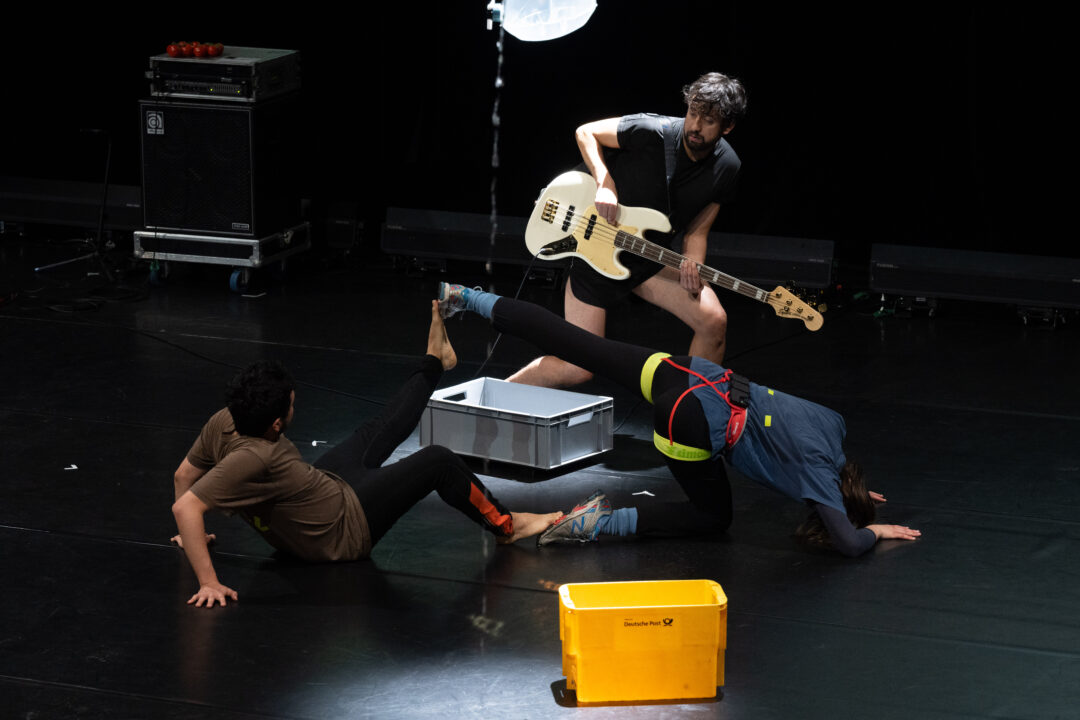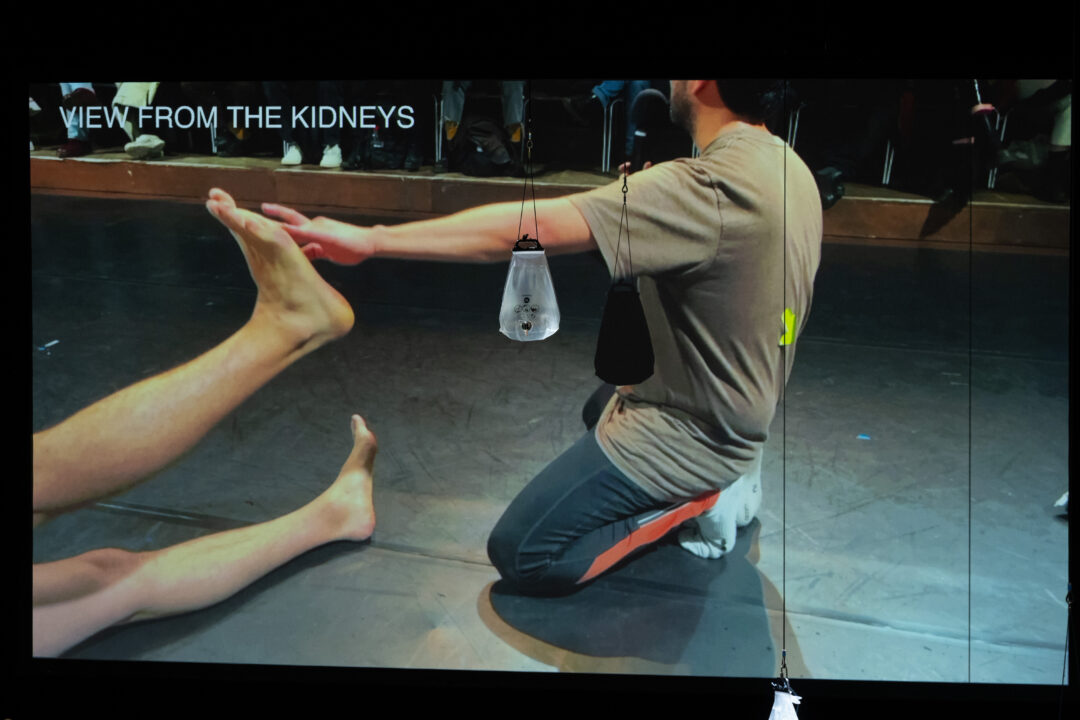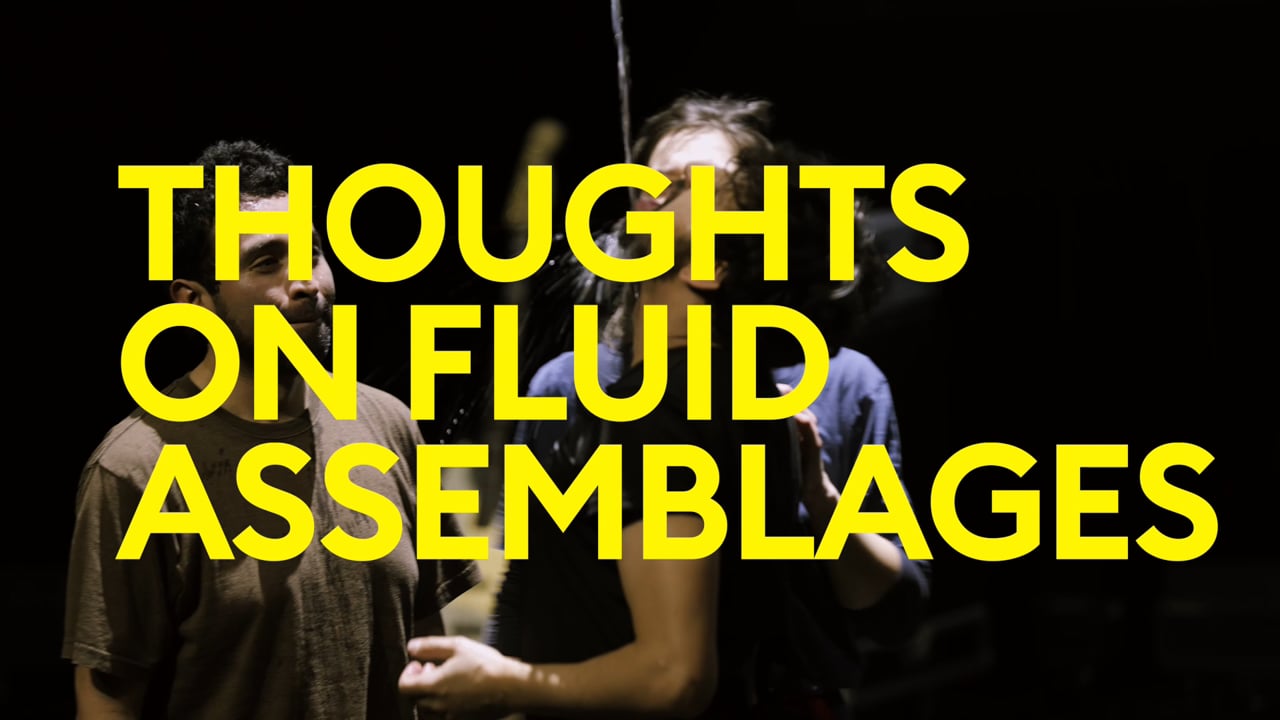Text by Flora Pitrolo
Photos by Camille Blake

The collective moniker under which Victor Artiga Rodriguez makes work—comprising of Artiga Rodriguez himself, Carla Anacker, Edgar Lessig, and Icaro Lopez de Mesa Moyano for this particular piece—is Tremenda Corporea. The name seems to relate “corporeal” and “tremenda,” which in English has slid semantically towards “tremendous” but whose Spanish meaning is closer to “horrible” or “awful.” The work Thoughts on Fluid Assemblages somehow manages to activate the nuances of both languages, conjugating the miserable, even the tragic, with the scale of the vast, the great. Artiga Rodriguez’s practice in general can be read through an attention to scale—bodily, local, global, cosmic—and even more crucially to one’s positioning, to one’s point of view in experiencing scale.
The title of this performance already engages scale and perspective, as it extends and expands the previous Fluid Assemblages, staged in 2023 with different collaborators, as a set of “exercises.” Meanwhile, the added outer encasing, Thoughts on, puts an existing work on the table for analysis in the new one, establishing a relation between the two that feels less like seriality and more like mise en abyme.
Remaking Contact
In our historical moment, the word fluidity tends to signal the instability of identities in singular experiences, so there is something delicious and disruptive in attaching the idea of fluidity to contact. In this sense, fluidity is not, or not only, protean and mobile but also, and perhaps more importantly, rooted in interaction and improvisation, contextual and responsive and, because of this, shape-shifting. At the same time, the re-utilization of the syntax of contact improvisation as a genre of the 1970s allows us to reframe its political substance, which—removed from the decolonial clarity we may be gaining now and the climate catastrophe we are most certainly facing—may have appeared less flagrant or less urgent at the time.
If contact improvisation considered itself radically anti-hierarchical, improvisational, and centered on co-responsibility, it was also always tinged with evocations of softness, naturalness, and escapism. These sentiments are echoed, for example, in choreographer Steve Paxton’s talk of “just want[ing] to be able to leave the planet and not worry about the re-entry.” Contact was therefore political in the key of the utopian, perhaps, and in this sense also preparatory for an idea of dance and dance culture in which leaving the planet may have become a political solution; still, relatively mellow in hindsight if we consider that Paxton’s Magnesium—widely credited as contact’s first public performance—was staged in 1972, around the same time as Foucault’s first formulations of biopower in the Collège de France lectures.
Renal Relations
Leaving the planet is very much not in the cards here, and the landings aren’t so soft. Indeed, Artiga Rodriguez redeploys the notion of contact in a performance that has its painful starting point in the acutely bio-political episode of a worker on an organic farm in El Salvador dying from kidney failure while Artiga Rodriguez was on residency there in 2021. The occurrence is unfortunately not rare, and as a Salvadoran himself, Artiga Rodriguez can never quite ignore the progressive poisoning instigated by intensive farming, which has colonized the bodies of Salvadorans as well as the land (“coffee, tobacco, bananas” is a refrain he pants during the performance). But because of a particularly adventurous kind of scale-thinking, the focus immediately becomes micro-micro-political, zooming in not so much onto that episode per se but further into its bodily location: the kidneys become the metaphorical site of the work and renal relations the conceptual and the choreographic stuff of the piece.
This makes for some extreme shifts in points of view. Both verbally and physically, the performance foregrounds the equation of body and landscape. Hydration packs—which feel medical and not outdoorsy in this context—are sucked on while speaking of oceans, lakes, and rivers. Bodies and bodies of water collapse here into a single planetary unit. A livestreamed “kidney cam” is strapped to the performer’s back at kidney height, and although it points outwards and films the room, it still evokes endoscopy, highlighting endoscopic looking as a kind of pornographic nay colonial gaze, just as controlling from the inside as the drone from above.
Beyond the perspectival though, the focus on the kidneys is choreographically strange and productive. Early in the piece, Artiga Rodriguez notes that the organs are “a little higher than I thought—Carla is going to mark them on me so I can feel it.” This reminds us that a kidney dance is a dance with an invisible, non-isolatable, unglamorous body part, just as much as it is powerful and necessary as an organ. Keeping contact with each other’s kidneys, a central tenet of this choreography, makes for an off-dance: lopsided, wooden at times, even painful. This rough and syncopated quality is central to how the performance feels (and thinks). Elastic yet hard, its relationship to fluidity is established as a problem and dealt with onstage in an almost awkward register that feels distant from both dance and body-based performance practices, staged as hesitant and private, in fact perhaps more like a thought.
Endless Returns
Return, in the geometric form of circularity, dominates the choreography, the stage itself, and the quality of text and movement: the water always comes back, from bodies of water to bodies and back, purified or poisoned, life-giving or deadly. However, with this piece, Bremen-based Artiga Rodriguez also returns to El Salvador, further layering these thoughts with his own return as artist and intellectual laborer, a voyage itself inscribed into much larger (here comes scale again) political, economic, and ecological dynamics, which also demand our careful attention. In this sense, making contact with the mysterious, toxin-flushing kidneys in Thoughts on Fluid Assemblages obliges us to attempt a contact with other hidden structures and ongoing processes to discern our place within them, laying our hands on our backs and feeling both tremendously powerless and powerful.








